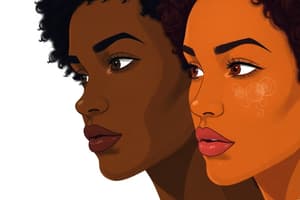Podcast
Questions and Answers
What do racial microaggressions typically reflect?
What do racial microaggressions typically reflect?
- Implicit bias (correct)
- Cultural insensitivity
- Overt discrimination
- Racial ignorance
Which of the following best describes microaggressions?
Which of the following best describes microaggressions?
- Deliberate acts of racism
- Unintentional everyday slights (correct)
- Acts of social justice
- Spoken insults towards another
How do individuals who commit microaggressions generally perceive themselves?
How do individuals who commit microaggressions generally perceive themselves?
- As moral and decent (correct)
- As overt racists
- As unconsciously biased
- As socially aware
What underlying message may be communicated through microaggressions?
What underlying message may be communicated through microaggressions?
Which group is most likely to experience microaggressions?
Which group is most likely to experience microaggressions?
What are common characteristics of microaggressions?
What are common characteristics of microaggressions?
Which of the following best captures the impact of microaggressions on marginalized groups?
Which of the following best captures the impact of microaggressions on marginalized groups?
Which of the following statements about implicit bias is accurate?
Which of the following statements about implicit bias is accurate?
In the context of racial microaggressions, what does the term 'perpetual foreigner' imply?
In the context of racial microaggressions, what does the term 'perpetual foreigner' imply?
How do microaggressions differ from overt racist acts?
How do microaggressions differ from overt racist acts?
Flashcards are hidden until you start studying
Study Notes
Racial Microaggressions
- Racial microaggressions are subtle, everyday slights and insults experienced by marginalized groups, often perpetuated by well-intentioned individuals unaware of their impact.
- Examples include compliments about speaking “good” English and the avoidance of seating next to Black individuals in public spaces.
- Constant microaggressions reflect implicit biases and prejudicial attitudes ingrained in society.
Impact of Microaggressions
- Any marginalized group can be the target, including racial, gender, LGBTQ, and disability demographics.
- Despite believing they are moral, individuals who commit microaggressions may unconsciously perpetuate societal biases.
- Microaggressions carry hidden messages that reinforce stereotypes:
- For Asians/Latinx, the suggestion of being perpetual foreigners,
- For Black individuals, the implication of being criminal or dangerous,
- For LGBTQ individuals, the labeling as sinners,
- For women, the risk of sexual objectification.
Misconceptions about Microaggressions
- The notion "sticks and stones may break my bones, but words will never hurt me" trivializes the harm caused by microaggressions.
- Critics argue these incidents are akin to everyday annoyances, but research highlights their significant damaging impact.
- Microaggressions accumulate over time, likened to “death by a thousand cuts,” leading to severe consequences for mental and physical health.
Psychological and Social Consequences
- Microaggressions increase stress levels, lower emotional well-being, contribute to depression, and impair mental health.
- They affect learning, problem-solving, and employee performance, creating wider inequities in employment, education, and healthcare.
- Research supports that microaggressions result in lower standard of living for people of color.
Call to Action
- Martin Luther King Jr. emphasized the need for action against not just blatant racism but also the passive acceptance of microaggressions.
- The question arises: how can well-meaning allies and bystanders interrupt and dismantle microaggressions?
- Columbia University's research focuses on "microinterventions," everyday actions that can be taken to combat bias and support affected individuals.
Racial Microaggressions
- Racial microaggressions are subtle, everyday slights and insults experienced by marginalized groups, often perpetuated by well-intentioned individuals unaware of their impact.
- Examples include compliments about speaking “good” English and the avoidance of seating next to Black individuals in public spaces.
- Constant microaggressions reflect implicit biases and prejudicial attitudes ingrained in society.
Impact of Microaggressions
- Any marginalized group can be the target, including racial, gender, LGBTQ, and disability demographics.
- Despite believing they are moral, individuals who commit microaggressions may unconsciously perpetuate societal biases.
- Microaggressions carry hidden messages that reinforce stereotypes:
- For Asians/Latinx, the suggestion of being perpetual foreigners,
- For Black individuals, the implication of being criminal or dangerous,
- For LGBTQ individuals, the labeling as sinners,
- For women, the risk of sexual objectification.
Misconceptions about Microaggressions
- The notion "sticks and stones may break my bones, but words will never hurt me" trivializes the harm caused by microaggressions.
- Critics argue these incidents are akin to everyday annoyances, but research highlights their significant damaging impact.
- Microaggressions accumulate over time, likened to “death by a thousand cuts,” leading to severe consequences for mental and physical health.
Psychological and Social Consequences
- Microaggressions increase stress levels, lower emotional well-being, contribute to depression, and impair mental health.
- They affect learning, problem-solving, and employee performance, creating wider inequities in employment, education, and healthcare.
- Research supports that microaggressions result in lower standard of living for people of color.
Call to Action
- Martin Luther King Jr. emphasized the need for action against not just blatant racism but also the passive acceptance of microaggressions.
- The question arises: how can well-meaning allies and bystanders interrupt and dismantle microaggressions?
- Columbia University's research focuses on "microinterventions," everyday actions that can be taken to combat bias and support affected individuals.
Studying That Suits You
Use AI to generate personalized quizzes and flashcards to suit your learning preferences.




